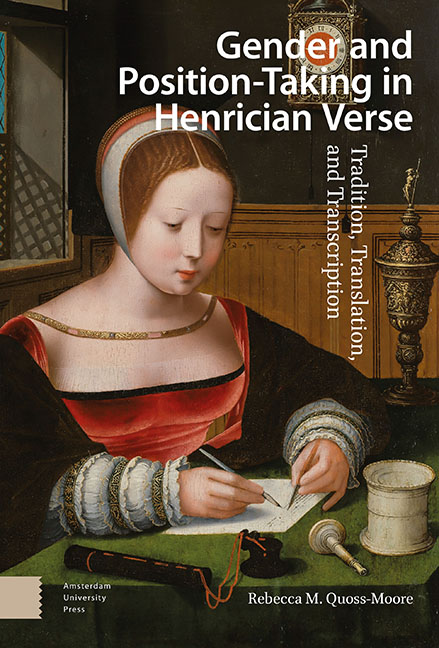Book contents
- Frontmatter
- Table of Contents
- Acknowledgements
- Introduction
- 1 Early Verse Position-Taking in the Henrician Court
- 2 Traditions of Resistance and Verse Position-Taking
- 3 Translation and the Position-Taking Verse Tradition
- 4 Men’s and Women’s Approaches to Translation and Authority in the Late Henrician Court
- 5 Transcription as Translation: Writing the Language of Manuscript Poetry
- 6 Resistance and Unity in the Douglas-Howard Exchange
- Conclusion
- Bibliography
- Index
Conclusion
Published online by Cambridge University Press: 13 February 2024
- Frontmatter
- Table of Contents
- Acknowledgements
- Introduction
- 1 Early Verse Position-Taking in the Henrician Court
- 2 Traditions of Resistance and Verse Position-Taking
- 3 Translation and the Position-Taking Verse Tradition
- 4 Men’s and Women’s Approaches to Translation and Authority in the Late Henrician Court
- 5 Transcription as Translation: Writing the Language of Manuscript Poetry
- 6 Resistance and Unity in the Douglas-Howard Exchange
- Conclusion
- Bibliography
- Index
Summary
Abstract: This conclusion emphasizes the need to shift our framework to consider Henrician verse work as position-taking, enabling a move away from a reification of individual authorship and allowing more space to consider both communal production and the prominence of women in court spaces for poetic production. Three threads come together in the work: the extension of our understanding of verse as political position-taking, combined with the work on manuscript poetry that emphasizes both multiple authorship and form as part of verse’s action, both creates and is reinforced by a framework that restores women to their place in Henrician courtly verse work. To demasculinize this literary history is to better understand the politics of communally read, communally created position-taking verse.
Keywords: Henrician translation; early modern women’s writing; Tudor verse transcription; Devonshire Manuscript; gendered canon formation; courtly love lyric
In the introduction to their edited collection of early modern letters, Robert J. Clements and Lorna Levant include the almost warning note that, in reading the collection as a whole, the ‘servility imposed by patrons on their greatest Humanists, writers, artists, and musicians emerges in a disturbing dimension’. The comment forewarns the reader of the shock of seeing, for example, Wyatt’s groveling, self-serving letter to Henry VIII, apparently written immediately after Anne Boleyn’s execution. In the letter, Wyatt claims to have warned the King that Anne was ‘a bad woman’ whom the King should not marry. More shockingly, he then goes on to accuse Anne of likely sleeping with a groom, after leaving her bed mid-tryst with Wyatt himself, and claims that within the same week he ‘had [his] way with her, and, if your Majesty, when you banished me, had permitted me to speak, I should have told you what I now write’. The surprise of the letter, of course, depends entirely on the accepted content of Wyatt’s poetry. Setting aside the general modern exoneration of Anne Boleyn, how to reconcile this damning letter with the content of critical poetry like ‘Who lyst his welthe and eas Retayne’ or even the less political, but still far from servile, ‘Who so list to hounte’? The answer lies in a complex negotiation of simultaneously separating and relating political, personal, and poetic strategies as understood and used by the Henrician court poet.
- Type
- Chapter
- Information
- Gender and Position-Taking in Henrician VerseTradition, Translation, and Transcription, pp. 235 - 240Publisher: Amsterdam University PressPrint publication year: 2023



